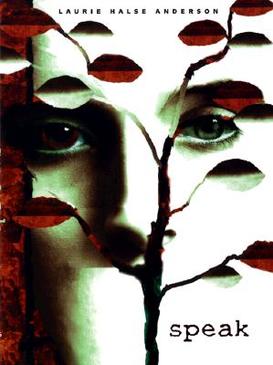“ Speak is the tough, tender, and darkly funny story of a teenage outcast.”

Banned in many schools across America, Speak, by Laurie Halse Anderson, has been at the center of a debate due to the question concerning the appropriateness of its content. Controversy has arisen regarding the novel based on its depiction of sensitive issues alleged to be unsuitable for the intended young adult audience. To some, however, this novel is a profound exploration of resilience, self-discovery, and the transformative power of finding one’s voice.
Now a novel, graphic novel, and film, Speak follows Melinda and her journey through her first year of high school. After calling the police at a party the previous summer because of a traumatic event, Melinda is an outcast to her friends and classmates. Dealing with the trauma has caused Melinda to withdraw more and more into her mind, silent to the outside world. She only expresses her voice through the art that she creates in Mr. Freeman’s class, but not even Mr. Freeman can truly understand what is going on in Melinda’s mind. Through her art, she is able to slowly gain her voice back and confront what silenced her in the first place.
What resonates with me is the authenticity of Melinda’s experience—the raw, unfiltered portrayal of her pain and isolation. As a reader, you’re not just an observer; you’re immersed in her world, feeling the weight of her silence and then the power of her eventual resurgence.
The novel’s artistic approach (particularly Melinda’s expression through her art) is another aspect that captivates me. In Mr. Freeman’s class, Melinda discovers a medium for her silenced voice—her art becomes a cathartic outlet for her pain. This creative element adds depth to the story and serves as a metaphor for the transformative power of self-expression.
Speak is the Michael L. Printz Award winner because of the impactful narrative that Anderson uses from her personal experiences, having dealt with a similar traumatic experience herself. Anderson’s personal connection to the narrative demonstrated in her poetic memoir Shout, adds an extra layer of empathy and sincerity to Melinda’s journey.
Speak is a compelling and emotional novel that deals with topics relevant to teens and adults, making this book an important addition to the world of literature. It shows the value of finding one’s voice and speaking up in difficult situations. Speak is a must-read for teens and adults alike, offering a touching and inspirational story that leaves a lasting impact on its readers.
—Alexis Tucker, Inscape Staff



